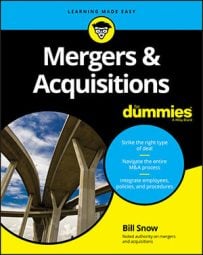The problem children of the mergers and acquisitions world are often known as troubled companies, special situations, challenged companies, and turnaround opportunities.
Troubled companies run the gamut from handyman’s specials that just need a little tender loving care to those that should be in bankruptcy. A company that is suffering from poor management decisions but remains a going concern (liquidation is not on the horizon) may make a suitable acquisition for an acquirer well versed in turnaround work.
On the other end of the spectrum, a company that is no longer a viable going concern should probably be liquidated by an orderly bankruptcy.
Although the reasons a company becomes troubled are virtually limitless, you can pool them into three distinct buckets:
Changes in the macro-economy: A general downturn in the economy, much like the one experienced in the latter years of the first decade of the new millennium, often has a chilling effect on many companies, including those that are fundamentally sound. An otherwise healthy company that has been beaten up by the market (suffered declining revenues and profits) is often a great acquisition for a savvy acquirer.
Managerial mistakes: Companies can suffer a downturn at the hands of poor management. Bad managerial decisions may or may not be tied to the general economy, and include overextending the company’s operations by opening too many new locations (often, the second location constitutes “too many”), making bad hires, neglecting to reinvest in the company, throwing company resources after a bad idea, and failing to participate in a new trend in the industry.
The good news is a company that has made managerial errors similar to those listed here may make a great pickup for the smart acquirer. The bad news is a company suffering through a series of near-fatal managerial mistakes may have burned bridges with its customers or suppliers. Consider yourself warned!
Changes in customer preferences: In the world of troubled companies, those affected by this situation are the most troubled of them all. Think of the proverbial story about buggy whip manufacturers in the wake of the advent of the automobile.
Sometimes, technology passes by a product; regardless of the product’s quality, companies can’t do much to regain market share when customers move on to new and better products. The word for this phenomenon is disintermediation.
If you own a troubled company, speak to your attorney and an M&A advisor about how to proceed with a potential M&A transaction. You may need to consider accepting a deal below your dream price because holding out for a better, future deal is risky. That better deal may never materialize, and the clock is ticking on the longevity of a troubled company.

